SWEDISH
SOUTH ASIAN STUDIES NETWORK
Newsletter 72:
 17
April
2007
17
April
2007
| SASNET News | Educational News |
| Research Community News | |
| Conferences and workshops | Important lectures and seminars |
| Cultural activities | New items on the web site |
• Work
report 2006 published
A
documentation about SASNET’s
work and activities during 2006 is now available at SASNET’s web
site.
The Administrative report no. 7 – a work report for the period 1 January
2006-31 december 2006 – was sent to Sida/SAREC and Lund University
on 12 April 2007. Go
for SASNET’s 2006 work report.
 • SIBC
organises India business seminar in Lund in collaboration with SASNET
• SIBC
organises India business seminar in Lund in collaboration with SASNET
On
Wednesday 23 May 2007, the Sweden-India Business
Council (SIBC) organises
an afternoon seminar in Lund titled ”The New India” (Det
nya Indien) in collaboration with SASNET and Ideon Science Park.
It targets companies and people in and around Lund interested in India.
SASNET’s Director, Prof. Staffan Lindberg will be the moderator
for the day, and he will also lecture about ”Vad är
nytt med Indien – förändringar de senaste 25 åren”.
Other participants include Susanna Bill, Innovations Manager at Sony
Ericsson Mobile Communications AB in Lund. She will talk about
”How to Unleash the Power of Emerging Markets”,
based on Sony Ericsson’s experiences. Anne-Charlotte Sukhia from
ACS Interkulturell Utbildning will talk about cultural differences in
business life, and Ingemar Ljungdahl from CTO Telelogic AB will present
the development of Telelogic AB in the Indian market. Venue: Ideon Science
Park, Knut Wicksells konferensrum, Scheelevägen 17, Lund. More
information (as a pdf-file)
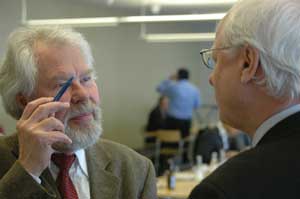 |
| Staffan Lindberg and Börje Ljunggren at the Hässleholm seminar. |
• India/China Seminar during EU Forum
in Hässleholm
A half-day seminar about ”The
European Union and China/India” was held in Hässleholm
on Tuesday 27 March 2007. It was organised by the Olof Palme International
Center as a part of a three-days EU Forum.
Among the invited speakers were Börje Ljunggren, former Ambassador
to China, and the MP Hillevi Larsson. SASNET’s Director, Prof.
Staffan Lindberg, talked about the Indian Challenge from a European
and a Swedish perspective, and he also held a speech about ”Growth,
Poverty and Democratization in India”. Marcus Lippert, CEO
for Indpro, and Fredrik Johansson, CEO for Panorama Competence, presented
their business projects in India. More
information.
• Time to apply for SASNET Planning grants
Applications
for the next round of SASNET
planning, workshop and guest lecture programme grants are now invited.
Closing date for applications is 15 June 2007. More
information.
• SASNET
film seminar on the Rhododendron Revolution in Nepal
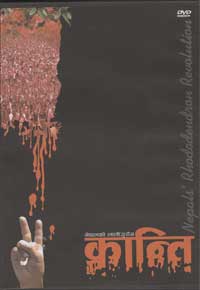 SASNET organises a combined
seminar/film show titled ”One
year after Nepal‘s Rhododendron Revolution” on Thursday
26 April 2007, 19.00. A film showing the dramatic events of
April 2006 that paved the way for a political settlement in Nepal has
been produced by the General Federation
of Nepalese Trade Unions (Gefont). It will be presented by Leif
Bjellin, researcher at the Dept. of Cell
and Organism Biology,
Lund University, with strong links to Nepal. After the film he will
speak about the changes that have taken place since the so-called Rhododendron
Revolution. The seminar is organised in collaboration with the Swedish
Organisation for Individual Relief (IM) and the Swallows
India-Bangladesh section (Svalorna), both organisations based in
Lund. Venue: Conference room, IM, Spolegatan 12 B, Lund. More
information.
SASNET organises a combined
seminar/film show titled ”One
year after Nepal‘s Rhododendron Revolution” on Thursday
26 April 2007, 19.00. A film showing the dramatic events of
April 2006 that paved the way for a political settlement in Nepal has
been produced by the General Federation
of Nepalese Trade Unions (Gefont). It will be presented by Leif
Bjellin, researcher at the Dept. of Cell
and Organism Biology,
Lund University, with strong links to Nepal. After the film he will
speak about the changes that have taken place since the so-called Rhododendron
Revolution. The seminar is organised in collaboration with the Swedish
Organisation for Individual Relief (IM) and the Swallows
India-Bangladesh section (Svalorna), both organisations based in
Lund. Venue: Conference room, IM, Spolegatan 12 B, Lund. More
information.
• Lecture series for Lund University
Masters students
In collaboration with the Centre
for East and South-East Asian Studies (ACE), SASNET has organised
a series a public lectures and seminars during the Spring 2007.
The lectures have been attended by the Lund University Masters
students in Asian Studies, as part of their training.
On Monday 26 March 2007, Ravinder Kaur,
Post-doctoral Fellow at Roskilde University, Denmark, gave a lecture
about ”Islam
between East and West – the political situation in Pakistan and
Afghanistan”. On Tuesday 3 April 2007,
Dr. Camilla Orjuela, Researcher at the Dept.
of Peace and Development Studies, School of Global Studies, Göteborg
University, lectured about ”Ethnicity and Violent Conflict
in Sri Lanka”.
On Tuesday 17 April, Neil Webster,
Senior researcher at Development Studies, Danish Institute of International
Studies (DIIS), Copenhagen, lectured about ”Nepal: Kingdom
versus Maoism”.
• SASNET
Seminar on fish production and aquaculture in India and Bangladesh
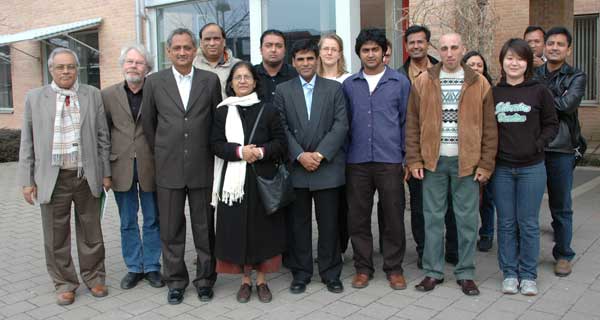 Dr.
Kazi Ali Toufique from Bangladesh and Prof. R. Parthasarathy from India
participated in a SASNET seminar about fish production and aquaculture
in India and Bangladesh in Lund on Thursday 15
March, 13.15–16.00.
Dr. Kazi Ali Toufique is affiliated to
Bangladesh Institute for Development Studies, BIDS, in Dhaka, and he
talked about ”Floodplain Aquaculture in Bangladesh: A
case of Enchantment or Disenchantment?". Prof. R.
Parthasarathy from the Gujarat Institute of Development Research
in Gota, Ahmedabad, India, talked about ”Governance Issues
in Natural Resources Management: The case of Fisheries in India”.
Prof. Both Dr. Toufique and Prof. Parthasarathy visited Sweden to participate
in a three-days workshop on ”Community Management of Openwater
Inland Fisheries in Bangladesh and India” held in Lund
14–17 March. The
seminar was organised in collaboration with the Dept.
of Economics.
Some of the seminar participants seen on the photo above.
Dr.
Kazi Ali Toufique from Bangladesh and Prof. R. Parthasarathy from India
participated in a SASNET seminar about fish production and aquaculture
in India and Bangladesh in Lund on Thursday 15
March, 13.15–16.00.
Dr. Kazi Ali Toufique is affiliated to
Bangladesh Institute for Development Studies, BIDS, in Dhaka, and he
talked about ”Floodplain Aquaculture in Bangladesh: A
case of Enchantment or Disenchantment?". Prof. R.
Parthasarathy from the Gujarat Institute of Development Research
in Gota, Ahmedabad, India, talked about ”Governance Issues
in Natural Resources Management: The case of Fisheries in India”.
Prof. Both Dr. Toufique and Prof. Parthasarathy visited Sweden to participate
in a three-days workshop on ”Community Management of Openwater
Inland Fisheries in Bangladesh and India” held in Lund
14–17 March. The
seminar was organised in collaboration with the Dept.
of Economics.
Some of the seminar participants seen on the photo above.
• More information about SASNET and its
activities
See SASNET’s page, http://www.sasnet.lu.se/sasnet.html
• Linnaeus
Palme grants to 34 South Asia related collaboration projects
 Decisions
have been taken about Linnaeus Palme exchange programme grants
for 2007-08. The seventh round of applications for Linnaeus
Palme grants, for the contract period 1 July 2007–
30 June 2008, were decided upon by the Swedish International Programme
Office for Education and Training on 16 March 2007. Out of 259
projects given grants, 3 are with Bangladesh, 23 with India, 1
with Nepal, 4 with Pakistan, and 3 with Sri Lanka. See
SASNET’s list on South Asia
related projects.
Decisions
have been taken about Linnaeus Palme exchange programme grants
for 2007-08. The seventh round of applications for Linnaeus
Palme grants, for the contract period 1 July 2007–
30 June 2008, were decided upon by the Swedish International Programme
Office for Education and Training on 16 March 2007. Out of 259
projects given grants, 3 are with Bangladesh, 23 with India, 1
with Nepal, 4 with Pakistan, and 3 with Sri Lanka. See
SASNET’s list on South Asia
related projects.
• Asia Link
Programme grant to IIE’s collaboration project with Afghanistan university
The
Institute of International Education (IIE) at Stockholm University
has managed to get major funding for an International collaboration
project with the Faculty of Education at Nangarhar University in Afghanistan.
Already in August 2004, the researchers Pia Karlsson and Amir Mansory
received a SASNET planning grant for
this project dealing with capacity development of Afghan educators,
but efforts to receive further funding for this important project have
been futile. But now, IIE has secured Euro 750 000 as an Asia Link
Programme from the European Commission. The project also involves three
other universities, in Germany, Finland and Nepal. More
information about the project.
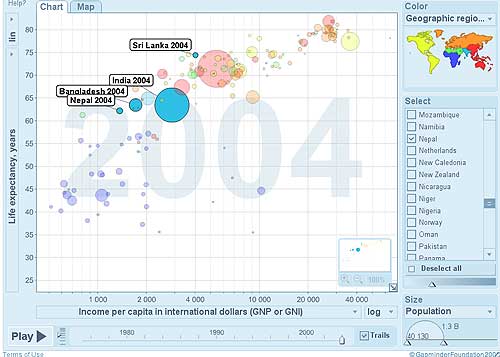 • Google
acquired Gapminder’s Trendalyzer
• Google
acquired Gapminder’s Trendalyzer
On 16 March 2007, Google acquired
Gapminder’s
Trendalyzer, developed by Prof. Hans Rosling at the Division of International
health (IHCAR),
Dept. of Public Health Sciences, Karolinska Institutet Medical University,
Stockholm. Google intends to improve and scale up Trendalyzer, and
make it freely available to those who seek access to statistics from
e g the World Health Development
Chart. Since 2001, Gapminder,
now a registered foundation based in Stockholm, has developed the Trendanalyzer
software, and through collaboration with United Nations Division of
Statistics and the UNDP, been able to visualize the fulfillment of
the millennium development goals in the yearly Human Development Reports
directly on the Internet. More information.
• Vice Chancellor of Anand Agricultural
University visits Lund University
Note: The visit has at the last moment been cancelled ![]()
 Dr.
M.C. Varshneya, Vice Chancellor of Anand Agricultural University (AAU)
in India, visits Lund University 9–11 May 2007.
Dr. Varshneya is also a member of the advisory committee of the so-called
SASNET Fermented Foods research group, and Vice Chairman of the Core
group on Centre of Excellence at the ministry of Food processing Industries,
Government of India. He has been invited to Sweden by Prof. Baboo Nair, Dept.
of Applied Nutrition and Food Chemistry, Lund Institute of Technology
(LTH), who first initiated the SASNET Fermented Foods collaboration project.
The objective of the meeting is to promote collaboration between Lund
University and AAU in the field of food processing. The collaboration
if it develops well would/could be, included in the present Indian national
effort in establishing four centres of excellence in food processing
at different parts of the country. More
information about the SASNET Fermented Foods project.
Dr.
M.C. Varshneya, Vice Chancellor of Anand Agricultural University (AAU)
in India, visits Lund University 9–11 May 2007.
Dr. Varshneya is also a member of the advisory committee of the so-called
SASNET Fermented Foods research group, and Vice Chairman of the Core
group on Centre of Excellence at the ministry of Food processing Industries,
Government of India. He has been invited to Sweden by Prof. Baboo Nair, Dept.
of Applied Nutrition and Food Chemistry, Lund Institute of Technology
(LTH), who first initiated the SASNET Fermented Foods collaboration project.
The objective of the meeting is to promote collaboration between Lund
University and AAU in the field of food processing. The collaboration
if it develops well would/could be, included in the present Indian national
effort in establishing four centres of excellence in food processing
at different parts of the country. More
information about the SASNET Fermented Foods project.
The visit to Lund includes not only meetings with researchers at LTH, but also
with representatives for Ideon Research Park, Lund Innovation and LUAB. While
in Lund, he will also meet with Professor M. Abdulla from the UNESCO
Institute of Trace Elements in Lyon, France, to discuss the establishment
of a Satellite Centre for trace element research at Anand Agricultural University.
After three days in Lund, Dr. Varshneya will also go to Stockholm, for meetings
at the Royal Institute of Technology, KTH, and the Embassy of India.
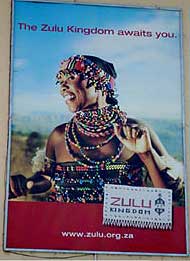 • Stockholm
symposium in honour of Chicago anthropologists
• Stockholm
symposium in honour of Chicago anthropologists
The Swedish Society for
Anthropology and Geography has decided to give Professor Jean Comaroff
and Professor John L. Comaroff, Department of Anthropology, University
of Chicago, its Golden Medal for 2007.
They receive the award in honour of their innovating efforts within
the field of historical anthropology and anthropological studies of
colonialism and post-colonialism. The prize ceremony will be held along
with a symposium titled ”Ethnicity Inc., and Other Aspects
of the Neoliberal Order” on the so-called Vega Day, Tuesday
24 April 2007, 10.00–13.00. The theme for the Vega Day symposium
has been chosen by the awardees, and will deal with the triumphal rise
of neoliberal capitalism, and how it is changing social life on a global
scale. Other invited speakers for the symposium are Professor Thomas
Blom Hansen, Amsterdam School for Social Science Research, who will
talk about ”The Things we Believe in. On
Objects and the Instability of Modern Belief”; and Professor
Shalini Randeria from Institute of Social and Cultural Anthropology,
University of Zurich, Switzerland, who will talk about ”The
De-politicization of Democracy and the Judicialization of Politics”.
Venue: Beijersalen, Kungliga Vetenskapsakademien, Stockholm. More
information.
 • SOAS
announces Lectorship in Bengali
• SOAS
announces Lectorship in Bengali
The School of Languages in collaboration
with the Department of the Languages and Cultures of South Asia at
the School of Oriental and African Studies (SOAS), University of London,
invites applications for a Lectorship in Bengali. He/she should be
an experienced teacher of Bengali language at all levels from Beginners
to Advanced. The post is from September 2007 and is linked to the new
BA degree in Bengali and another subject that will be offered from
September 2008. Appointment will be for three years in the first instance,
renewal being subject to the success of the new degree programme. Closing
date for applications is 8 May 2007. More
information.
• Announcement for Assistant Professorship
in South Asian Studies in Aarhus
The Institute of History and Area Studies at the University
of Aarhus in Denmark invites applications for an Assistant Professorship
in South Asian Studies. The position is tenable from 1 August
2007. Applicants should hold a PhD degree within an area relevant to
the study of contemporary Indian society, history or culture. Applications
are welcomed from applicants with a background in history, political
science or anthropology. Applicants with a good knowledge of Hindi
a will be preferred. Closing date for applications is Monday 14 May
2007. More
information.
• ENCARI encourages researchers to share their working
papers
 The
European Network on Contemporary Academic Research on India (ENCARI)
invites its members to download some of their working papers on the ENCARI
website in order to foster the exchange of ideas and to promote a dialogue
among researchers, scholars, and practitioners in the field. The working
papers must deal with any subject matter pertaining to EU-India exchange
and collaboration. Staff members of the European Commission and team
members of the ENCARI project will evaluate all proposed entries for
quality and relevance.
It is understood that the working papers solely represent the author’s
own perspective and will not necessarily reflect the views of the European
Commission or the ENCARI project. The author of the working paper will
maintain copyright of the manuscript and is free to publish or disseminate
it in any other form that he or she deems appropriate. The European Commission
or any of its agencies may not publish the working paper without express
authorization from the author.
The
European Network on Contemporary Academic Research on India (ENCARI)
invites its members to download some of their working papers on the ENCARI
website in order to foster the exchange of ideas and to promote a dialogue
among researchers, scholars, and practitioners in the field. The working
papers must deal with any subject matter pertaining to EU-India exchange
and collaboration. Staff members of the European Commission and team
members of the ENCARI project will evaluate all proposed entries for
quality and relevance.
It is understood that the working papers solely represent the author’s
own perspective and will not necessarily reflect the views of the European
Commission or the ENCARI project. The author of the working paper will
maintain copyright of the manuscript and is free to publish or disseminate
it in any other form that he or she deems appropriate. The European Commission
or any of its agencies may not publish the working paper without express
authorization from the author.
• Call for papers on Population and Security in India
and Pakistan
Population Review, a peer-review
journal of demography and population studies published since 1957, calls
for papers to a Special Issue on ”Population and Security in India
and Pakistan” for
publication in the summer edition of Population Review (volume 47, number
1, 2008). The
goal of this special issue is to introduce demographers and population
specialists to the complex population-related security challenges facing
India and Pakistan. Papers that focus on the relationship between
population factors and one or more of the following dimensions and conceptualizations
of security: individual, human, societal, state, regional, economic
and environmental, are preferred. Analytical papers based on original
data and sound statistical analysis will be given preference for acceptance. All
submissions will pass through the standard peer-review process. The
submission process will end after 5 quality articles have been accepted
for publication.
• Fifth Winter Course on Forced
Migration in Kolkata
The Fifth Winter Course on Forced
Migration will be held in Kolkata, India 1–15 December 2007. The
short-term winter course, organised each year by the Mahanirban Calcutta
Research Group, will be preceded by a two and a half month long programme
of distance education. The course is intended for younger academics,
refugee activists and others working in the field of human rights and
humanitarian assistance for victims of forced displacement. The curriculum
will deal with themes of nationalism, ethnicity, partition, and partition-refugees,
national regimes and the international regime of protection, political
issues relating to regional trends in migration in South Asia, internal
displacement, the gendered nature of forced migration and protection
framework, resource politics, environmental degradation, and several
other issues related to the forced displacement of people. Deadline
for applications is 31 May 2007. More
information.
• More information about South Asia related
research at Swedish and Nordic universities
See SASNET’s page, http://www.sasnet.lu.se/research.html
•
Göteborg University course on visual culture and its
role in India and China
 In
the Fall 2007, Museion at Göteborg University arranges a 15 credits
course titled ”Tales
of Objects: between traditions and modernities in India and China”. The
course aims at providing tools for understanding visual culture and its
role. The work material consists of objects from the collections of the
Museum of World Culture, combined with modern ethnographic material,
through which aspects of ancient and contemporary Indian and Chinese
culture and society will be studied. The course will be led by the Sinologist
Marie Carlsson and Dr. Eva Rosén-Hockersmith from
the Dept. of Religous Studies and Theology,
Göteborg University.
In
the Fall 2007, Museion at Göteborg University arranges a 15 credits
course titled ”Tales
of Objects: between traditions and modernities in India and China”. The
course aims at providing tools for understanding visual culture and its
role. The work material consists of objects from the collections of the
Museum of World Culture, combined with modern ethnographic material,
through which aspects of ancient and contemporary Indian and Chinese
culture and society will be studied. The course will be led by the Sinologist
Marie Carlsson and Dr. Eva Rosén-Hockersmith from
the Dept. of Religous Studies and Theology,
Göteborg University.
• Heidelberg
Summer School in Spoken
Sanskrit
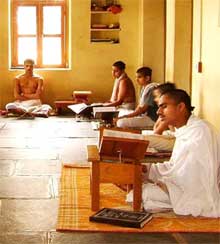 For the eighth year in a row, the Dept. of Classical Indology
at the South Asia Institute, Heidelberg, Germany announces a Summer
School in Spoken Sanskrit, 30 July – 24 August 2007. Since
its start back in the year 2000 it has attracted students and lecturers
of Indological, Religious and South Asian Studies from all over the
world to practice Sanskrit in a different way: Under the guidance of
Dr. Sadanada Das, a Sanskrit native speaker from Benares, all those
with a basic knowledge of Sanskrit grammar and vocabulary shall learn
to carefully listen, to accurately pronounce and to slowly speak and
recite this beautiful language. The four-week intensive course helps
strengthening the skills, making the study of Sanskrit a lively and
creative experience. Prerequisites: elementary Sanskrit and English.
Deadline for applications is 15 May 2007.
For the eighth year in a row, the Dept. of Classical Indology
at the South Asia Institute, Heidelberg, Germany announces a Summer
School in Spoken Sanskrit, 30 July – 24 August 2007. Since
its start back in the year 2000 it has attracted students and lecturers
of Indological, Religious and South Asian Studies from all over the
world to practice Sanskrit in a different way: Under the guidance of
Dr. Sadanada Das, a Sanskrit native speaker from Benares, all those
with a basic knowledge of Sanskrit grammar and vocabulary shall learn
to carefully listen, to accurately pronounce and to slowly speak and
recite this beautiful language. The four-week intensive course helps
strengthening the skills, making the study of Sanskrit a lively and
creative experience. Prerequisites: elementary Sanskrit and English.
Deadline for applications is 15 May 2007.
• Delhi to have first pan-South
Asian university
The Indian Prime Minister Manmohan Singh’s
idea of a South Asian University has started taking shape with the
seven SAARC members agreeing that it be housed in India, preferably
Delhi. If Delhi actually becomes the venue, it would be among the few
world capitals to boast of so many universities, six to be precise.
The proposed SAU would witness free flow of students as well as faculty
from Pakistan, Bangladesh, Bhutan, Nepal, Sri Lanka, India and the
Maldives. Sources say it would take another two-three years before
SAU becomes a reality. The decision to have SAU in India was taken
at a meeting of university regulatory bodies of Saarc countries. The
concept note was prepared by Guhar Rizvi, a Bangladeshi national, of
Harvard University. Read
more in Times of India.
• Foreign institutes seek
local partners in India
Even though a law on allowing Foreign Direct
Investments in higher education may still take some time to materialise
in India,
higher educational institutes from many countries have started exploring
opportunities for setting up campuses and partnership in the country.
Representatives of nearly 200 universities and colleges from the US,
UK and Europe have visited India in a period of just 3 months. Read
more in an article from the Economic Times.
• HEC sets ups Plagiarism
Detection Cell in Pakistani universities
The Higher
Education Commission (HEC) in Pakistan has decided to set up a Plagiarism
Detection Cell in collaboration with the public sector universities of
the country, HEC executive director Suhail H Naqvi says. Plagiarism-detecting
software would be provided to the universities to compare the materials
against international literature. He said the universities should monitor
all PhD theses and research publications of their teachers. Read
more in Daily Times 27 march 2007.
• More information about South Asia related
education at Swedish and Nordic universities
See SASNET’s page, http://www.sasnet.lu.se/education.html
• Professor
Jyoti Puri participates in Focus Asia Seminar in Lund
 The
Centre for East and Southeast Asian Studies at Lund University invites
to another Focus Asia seminar 17–18
April 2007.
It includes a workshop titled ”The intersections between
Desires and Violences” that partly focuses on South Asia.
The purpose of the workshop is to examine the contingent intersections
between symbolic as well as manifested forms of desires and violences
in Asia and at a more general level. One of the participants is Associate
Professor Jyoti Puri (photo), Dept. of Sociology and Women’s
Studies, Bombay University, India (but currently affiliated to the Gender/Cultural
Studies (GCS) program at Simmons College, Boston University, USA).
She will talk about "Sexuality/State/Biopolitics: Notes from
New Delhi". Dr. Puri is particularly interested in the ways
that the constructions of gender and sexuality are being shaped within
a transnational context. Her book, ”Women, Body, Desire in
Postcolonial India: Narratives of Gender and Sexuality”,
was published by Routledge in 1999. Venue for Focus Asia 2007: Hotel
Lundia; Knut den Stores Torg 2, Lund. More
information.
The
Centre for East and Southeast Asian Studies at Lund University invites
to another Focus Asia seminar 17–18
April 2007.
It includes a workshop titled ”The intersections between
Desires and Violences” that partly focuses on South Asia.
The purpose of the workshop is to examine the contingent intersections
between symbolic as well as manifested forms of desires and violences
in Asia and at a more general level. One of the participants is Associate
Professor Jyoti Puri (photo), Dept. of Sociology and Women’s
Studies, Bombay University, India (but currently affiliated to the Gender/Cultural
Studies (GCS) program at Simmons College, Boston University, USA).
She will talk about "Sexuality/State/Biopolitics: Notes from
New Delhi". Dr. Puri is particularly interested in the ways
that the constructions of gender and sexuality are being shaped within
a transnational context. Her book, ”Women, Body, Desire in
Postcolonial India: Narratives of Gender and Sexuality”,
was published by Routledge in 1999. Venue for Focus Asia 2007: Hotel
Lundia; Knut den Stores Torg 2, Lund. More
information.
• Gavin Flood lectures at Södertörn
conference
A
conference on ”Religion
on the Borders: New Challenges in the Academic Study of Religion” will
be held at Södertörn
University College south of Stockholm, 19–22 April 2007.
The ambition with the conference is to gather scholars from different
academic disciplines to engage in discussions on religion and borders
in the past and the present, in theory and in practice. It is organized
in collaboration with IAHR (International
Association for the History of Religions) and SSRF (Swedish Society
for the Study of History of Religions). The Keynote speakers include
Professor Gavin Flood, Academic director at the Oxford
Centre for Hindu Studies and Professor of Religion, University
of Stirling, UK. He will lecture about ”Dwelling on the Borders:
Self, Religious Reading, and the Public Realm”. More
information.
• Preconference
by the Legal Studies Working
Group at Madison
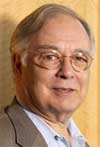 The University of Wisconsin-Madison’s South Asian
Legal Studies Working Group announces a one-day intensive workshop
at the start of the 36th Annual South Asia conference, on
Thursday 11 October 2007. The pre-conference seeks to overcome a number
of divides between scholars, particularly between those working on
colonial versus post-colonial subjects; inside and outside of law schools;
and inside and outside of institutions in South Asia. It aims to build
a sense of community between scholars by providing a forum in which
junior and senior scholars can interact. Prof. Marc Galanter (photo),
John and Rylla Bosshard Professor of Law and South Asian Studies at
UW-Madison, and Prof. Mitra Sharafi will host the event. The day will
include addresses by senior scholars in the field, and will close with
a screening of the UW documentary, “Courts and Councils:
Dispute Settlement in India”. The event will coincide with
a Madison meeting of contributors to The Cambridge Companion to
Law and Hinduism,
a volume co-edited by UW Prof. Don Davis. Venue for the pre-conference:
University of Wisconsin Law School in Madison. More
information.
The University of Wisconsin-Madison’s South Asian
Legal Studies Working Group announces a one-day intensive workshop
at the start of the 36th Annual South Asia conference, on
Thursday 11 October 2007. The pre-conference seeks to overcome a number
of divides between scholars, particularly between those working on
colonial versus post-colonial subjects; inside and outside of law schools;
and inside and outside of institutions in South Asia. It aims to build
a sense of community between scholars by providing a forum in which
junior and senior scholars can interact. Prof. Marc Galanter (photo),
John and Rylla Bosshard Professor of Law and South Asian Studies at
UW-Madison, and Prof. Mitra Sharafi will host the event. The day will
include addresses by senior scholars in the field, and will close with
a screening of the UW documentary, “Courts and Councils:
Dispute Settlement in India”. The event will coincide with
a Madison meeting of contributors to The Cambridge Companion to
Law and Hinduism,
a volume co-edited by UW Prof. Don Davis. Venue for the pre-conference:
University of Wisconsin Law School in Madison. More
information.
• ISAS organises its 3rd International
Conference on South Asia in Singapore
The Institute
of South Asian Studies (ISAS), established in 2004 as an autonomous
research institute within the National University of Singapore,
invites to its 3rd International Conference on South Asia in November
2007 (probable dates 28–29 November). The theme for the conference
will be ”Political Economy of Growth,
Inequality and Conflict”,
focusing on the rapid socio-economic and political transitions underway
throughout South Asia. The conference will provide a forum for presenting
and discussing results of fresh research on this vital subject, for
comparing and learning from national experiences within the region
and for promoting future collaboration among scholars of the region.
• Other conferences connected to South Asian
studies arranged all over the World
See SASNET’s page, http://www.sasnet.lu.se/conferences.html#conf
Important lectures and workshops
• Uppsala seminar with Henrik Chetan
Aspengren from SOAS
Henrik Chetan
Aspengren, PhD Candidate at School of Oriental and African Studies
(SOAS) in London, lectures about
”Recovering lineages or revisiting the past – Why should we
historicize development policy?” at Uppsala University on Wednesday
18 April 2007, 10.30–12.00. The seminar is jointly organised the Dept.
of of Urban and Rural Studies, Swedish University of Agricultural
Sciences (SLU) and Uppsala University’s Seminar for Development
Studies (SDS). The political scientist Mr. Aspengren will present ongoing
research on the politics of colonial urban and rural development in Bombay
Presidency in India c. 1915-35. He will initiate a discussion on the
extent to which a historical perspective could contribute to the study
of the political in development policy. Venue: Conference room in the
basement, Dept. of Urban and Rural Studies, SLU, Ulls väg 28, Uppsala.
• Vibha Arora lectures in Uppsala about
Kanchenjunga
Dr. Vibha Arora from the Indian Institute of Technology
(IIT), New Delhi, India, lectures at Uppsala University on
Tuesday 24 April 2007, 14.15–16.00. Dr. Arora will talk about ”Identity,
Indigeneity and Belonging in the Sacred Landscape: Worshipping Mt.
Kanchenjunga in Sikkim”. The lecture is part of a seminar
series organised by the South Asia
Seminar at Uppsala University. Venue: Room
9-3068, Dept. of Lingustics and Philology, Engelska Parken, Uppsala.
• Stockholm lecture by Jan Aart Scholte
Jan
Aart Scholte, Professor in Politics and International Studies, University
of Warwick, holds a lecture in Stockholm on Tuesday 24 April 2007, 18.00.
Prof. Scholte, currently a guest researcher at the School of Global
Studies, Göteborg University, will talk
about ”What is the contribution of Social Movements and Trade
Unions to the possibilities of Global Civil Society and Global Governance?”.
The seminar, part of a series of lectures about social movements, is
organised by the recently established Swedish Social Movements Network
(”Rörelsenätverket”) in collaboration with ABF.
• Swati Chattopadhyay lectures in Uppsala
Dr.
Swati Chattopadhyay, Associate Professor of History of Art and Architecture
at University of California, Santa Barbara, USA, lectures in Uppsala on
Thursday 3 May 2007, 14.00. Dr. Chattopadhyay, who is a Bengali architect
and architectural historian specialized in the history of modern architecture
and urbanism, the cultural landscape of British colonialism, and post-colonial
theory, will talk about
”The Art of Mobility”. She spends the academic year
2006-07 in Sweden as a Fellow in Residence at the Uppsala based Swedish
Collegium for Advanced Study (SCAS). Venue: SCAS, Linneanum, Thunbergsvägen
2, Uppsala. More
information.
• David Hardiman lectures about
Agendas for Subaltern Studies
Prof.
David Hardiman from Warwick University, UK, lectures at Uppsala University on
Monday 14 May 2007, 14.15–16.00.
Prof. Hardiman, who is historian and a founding member of the Subaltern
Studies group, will talk about ”Agendas for Subaltern Studies:
Trajectories for Writing Histories from Below”. Among his
recent publications are "Histories of the Subordinated" (2006)
and "Gandhi in his Time and Ours" (2003). The lecture is
part of a seminar series organised by the South
Asia Seminar at Uppsala University. Venue: Room
6-0031, Dept. of Lingustics and Philology, Engelska Parken, Uppsala. More
information about Prof. Hardiman.
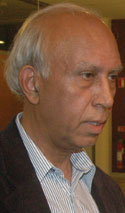 • Ishtiaq
Ahmed lectures in Stockholm about the 60th Anniversary
of Pakistan
• Ishtiaq
Ahmed lectures in Stockholm about the 60th Anniversary
of Pakistan
Professor
Ishtiaq Ahmed from the Dept. of Political
Science, Stockholm University, will lecture on ”The 60th
Anniversary of Pakistan: An Evaluation of its Nation-Building and State-Building
Projects” in Stockholm on Wednesday 16 May 2007,
15–17. It is one of the Wednesday lectures arranged by the Centre
for Pacific Asian Studies, CPAS, at Stockholm University. Venue for
the lecture: Dept. for Oriental Languages, Kräftriket 4 (earlier
Roslagsvägen 101), Stockholm.
South Asia related culture in Scandinavia
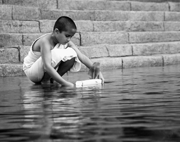 • Deepa
Mehta’s film trilogy screened at IFEMA festival in Malmö
• Deepa
Mehta’s film trilogy screened at IFEMA festival in Malmö
The Indo-Canadian
Director Deepa Mehta’s
film trilogy of the three elements, Earth, Fire and Water, will be
screened during the 2007 International Female Film Festival in Malmö (IFEMA),
18–20 April
2007. IFEMA sets its focus on women’s rights and the conditions
of women around the world. Besides film shows, a lecture on ’Women,
Fashion and Identity in Contemporary Cinema’ will be held, and
also a Think Tank debate and a "Pitching Coaching" workshop
for women working professionally with film. More
information about IFEMA 2007 and Deepa Mehta’s three films (photo
from the 2005 film ”Water”, the last in the trilogy).
•
Bengali New Year Celebration in Göteborg
A celebration of the Bengali
New Year 1414 will be held in Göteborg
on Sunday 22 April 2007, 17.45. It is organised by the Association
of Bangladeshi Students (ABS), based at Chalmers University of Technology
and Göteborg University, and includes a cultural programme with
songs and dance performances. The Honorable Ambassador of Bangladesh
in Scandinavia, Mr. Muhammad Azizul Haque, will hold a speech, and a
traditional Bangladeshi dinner will be served. SASNET wil be represented
by its Deputy Director Lars Eklund. Venue: Lecture Hall HC4, Chalmers
University of Technology, Göteborg. More
information.
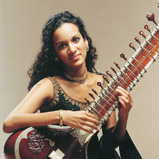 • Abida
Parveen and Anoushka Shankar perform at Södra Teatern in Stockholm
• Abida
Parveen and Anoushka Shankar perform at Södra Teatern in Stockholm
The
legendary Queen of Sufi Music Abida Parveen from Pakistan again visits
Sweden. She will perform at Södra
Teatern in Stockholm on Friday 25 May 2007, 20.30 More
information.
The day before, Thursday 24 May 2007, 19.30, Anoushka Shankar
Project will perform on the same stage at Södra Teatern.
Anoushka (photo to the right), daughter of Ravi Shankar,
will play the sitar, accompanied by musicians playing tablas,
flute, piano and percussion. More
information.
• More information about South Asia related
culture in Scandinavia
See SASNET’s page, http://www.sasnet.lu.se/culture.html
New and updated items on SASNET web site
• Swedish departments where research
on South Asia is going on:
Constantly added to the list of research environments at Swedish
universities, presented by SASNET. The full list now includes 206 departments,
with detailed descriptions of the South Asia related research and education
taking place! Go
to http://www.sasnet.lu.se/environment.html
ƒ Centre for Innovation, Research and Competence in the Learning Economy, CIRCLE, Lund University
Best regards,
Staffan Lindberg Lars Eklund
SASNET/ Swedish South Asian Studies Network
SASNET is a national network
for research, education, and information about South Asia, based at Lund
University. The aim is to encourage and promote an open and dynamic networking
process, in which Swedish researchers co-operate with researchers in South
Asia and globally.
The network is open to all sciences. Priority is given to co-operation
between disciplines and across faculties, as well as institutions in the
Nordic countries and in South Asia. The basic idea is that South Asian
studies will be most fruitfully pursued in co-operation between researchers,
working in different institutions with a solid base in their mother disciplines.
The network is financed by Sida (Swedish
International Development Cooperation Agency) and by Lund
University.
Postal address: SASNET – Swedish South Asian Studies Network,
Scheelevägen 15 D, SE-223 70 Lund, Sweden
Visiting address: Ideon Research Park, House Alfa 1 (first floor,
room no. 2040), in the premises of the Centre for East and South East
Asian Studies at Lund University (ACE).
Phone: + 46 46 222 73 40
Fax: + 46 46 222 30 41
E-mail: sasnet@sasnet.lu.se
Web site:
http://www.sasnet.lu.se
Staff: Staffan
Lindberg, director/coordinator & Lars
Eklund, webmaster/deputy director
SASNET - Swedish South Asian Studies Network/Lund
University
Address: Scheelevägen 15 D, SE-223 70 Lund, Sweden
Phone: +46 46 222 73 40
Webmaster: Lars Eklund
Last updated
2011-04-29
